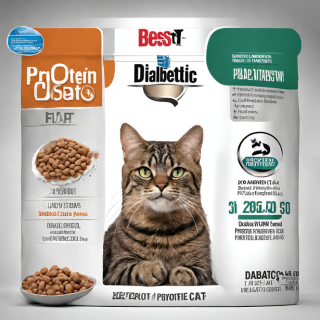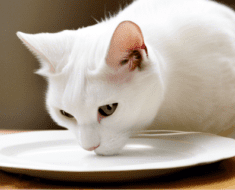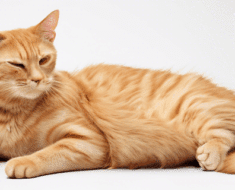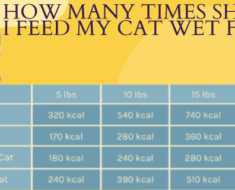The best protein for diabetic cats is high-quality, lean protein such as chicken or fish. Cats with diabetes require a diet low in carbohydrates and high in protein.
Providing them with high-quality, lean protein sources like chicken or fish ensures they get the necessary nutrients without spiking their blood sugar levels. These proteins are easily digestible, provide essential amino acids, and help maintain muscle mass.
It is important to consult with a veterinarian to determine the ideal protein sources and portions for your diabetic cat’s specific needs. By feeding them the right protein, you can help manage their diabetes and improve their overall health.
Protein-rich Diet For Diabetic Cats
A protein-rich diet is crucial for diabetic cats, focusing on high-quality sources such as lean meats, eggs, and fish. These options offer essential amino acids and promote better blood sugar control, helping to support overall feline health.
High-quality Protein Sources
A protein-rich diet plays a crucial role in managing diabetes in cats. The right protein sources can help stabilize blood sugar levels, promote weight loss, and improve overall health. It is essential to choose high-quality protein sources that provide the necessary nutrients while minimizing carbohydrates and unhealthy additives. Here are some excellent protein sources for diabetic cats:
- Lean meats: Chicken, turkey, and fish are excellent sources of protein for diabetic cats. Choose boneless, skinless options to avoid excess fat and seasonings that may affect blood sugar.
- Eggs: Eggs are a nutritious protein source that can be included in the diet of diabetic cats. They are rich in amino acids and provide essential nutrients such as vitamins and minerals.
- Low-fat dairy products: Plain yogurt, cottage cheese, and other low-fat dairy products can be incorporated into a diabetic cat’s diet. These provide protein and calcium while keeping the fat content in check.
- Legumes: Chickpeas, lentils, and other legumes are plant-based protein sources that can be beneficial for diabetic cats. They offer sustained energy without causing significant spikes in blood sugar levels.
Protein Types To Avoid
While some protein sources are beneficial for diabetic cats, certain types should be avoided. These may contribute to increased blood sugar levels or cause other health complications. The following protein sources are best to be avoided in a diabetic cat’s diet:
- Fatty cuts of meat: Fatty cuts of meat, such as beef, lamb, and pork, should be avoided as they can lead to weight gain and may exacerbate insulin resistance.
- Processed meats and pet treats: Processed meats and pet treats often contain added sugars and carbohydrates that can spike blood sugar levels. These should be avoided to maintain stable glucose levels.
- Plant-based proteins high in carbohydrates: Some plant-based proteins, like soy and corn gluten, are high in carbohydrates. These can disrupt blood sugar levels and should be limited in a diabetic cat’s diet.
- High-sodium foods: Cats with diabetes are more prone to developing kidney disease, and high-sodium foods can put additional strain on their kidneys. Avoid excessively salty foods and treats.
Best Protein Choices for diabetic cats
When it comes to choosing the best protein for diabetic cats, it’s vital to prioritize high-quality, easily digestible options that help manage blood sugar levels and support overall health. Making informed choices about the protein sources in your cat’s diet can contribute significantly to maintaining their well-being. Here are some excellent protein choices to consider:
Lean Meat Options
Lean meats are a great source of protein for diabetic cats due to their low-fat content and high-quality protein. Chicken, turkey, and lean beef are excellent choices as they provide essential nutrients without causing spikes in blood sugar levels. Always ensure that the meat is cooked thoroughly to eliminate any potentially harmful bacteria.
Fish-based Proteins
Feeding your diabetic cat fish-based proteins like salmon, tuna, or whitefish can be beneficial. These proteins offer healthy omega-3 fatty acids, which can help reduce inflammation and support heart health. It’s important to feed fish in moderation and ensure it’s cooked and free from any bones to prevent choking hazards.
Plant-based Proteins for diabetic cats
When it comes to the dietary needs of diabetic cats, choosing the right protein source is crucial for their overall health and well-being. While animal-based proteins are often the go-to choice, plant-based proteins can also offer unique benefits for diabetic cats. In this section, we’ll explore the benefits and drawbacks of incorporating plant-based proteins into a diabetic cat’s diet and provide tips for doing so safely.
Benefits And Drawbacks
- Plant-based proteins can be easier to digest for diabetic cats with sensitive stomachs.
- They can provide a variety of essential nutrients such as fiber, vitamins, and minerals.
- Lower in fat than some animal-based proteins, which can be beneficial for weight management in diabetic cats.
- May lack certain essential amino acids found in animal-based proteins, potentially requiring supplementation.
- Some plant-based proteins, such as soy or wheat, may cause allergic reactions in sensitive cats.
- The digestibility and bioavailability of plant-based proteins can vary, affecting their overall nutritional value.
Incorporating Plant Proteins Safely
When incorporating plant-based proteins into a diabetic cat’s diet, it’s important to do so carefully and with consideration for their unique nutritional needs. Here are some tips for ensuring the safe integration of plant proteins:
- Consult with a veterinarian to determine the best plant-based protein sources and ensure balanced nutrition.
- Gradually introduce new plant proteins to monitor the cat’s response and tolerance.
- Monitor for any signs of allergic reactions or digestive upset when introducing new plant-based proteins.
- Consider supplementation to ensure the cat receives all necessary essential nutrients.
Supplements To Support The Protein Diet
When it comes to managing diabetes in cats, a carefully crafted protein diet is essential for their overall well-being. However, sometimes it’s necessary to further support their dietary needs with the help of supplements. These additional nutrients can aid in maintaining their energy levels, promoting a healthy immune system, and improving digestion. Here, we will explore two key supplements to consider for diabetic cats: vitamins and minerals, and probiotics and digestive enzymes.
Vitamins And Minerals
Vitamins and minerals play a crucial role in supporting a cat’s overall health, including their blood sugar regulation. Providing the right balance of these essential nutrients can help prevent deficiencies and promote optimal well-being for your diabetic cat. Here are some important vitamins and minerals to consider:
- Vitamin E: This powerful antioxidant helps reduce inflammation and protect cells from damage. Feed your cat a diet rich in vitamin E or consult your vet for appropriate supplements.
- Vitamin B: The B-vitamin complex aids in energy production and nerve function. Diabetic cats may benefit from supplements that include B vitamins such as thiamine, riboflavin, and cyanocobalamin.
- Chromium: This mineral assists in insulin function and helps maintain stable blood sugar levels. Consider a chromium supplement to aid in the management of diabetes in your cat.
Probiotics And Digestive Enzymes
A healthy digestive system is crucial for diabetic cats, as it helps optimize nutrient absorption and supports overall gut health. Introducing probiotics and digestive enzymes into their diet can aid in digestion and prevent gastrointestinal issues. Here’s how these supplements can benefit your cat:
- Probiotics: These live bacteria help maintain a balanced gut flora, reducing the risk of digestive disturbances and enhancing immune function. Look for probiotic supplements specifically formulated for cats and consult your vet for proper dosage.
- Digestive Enzymes: These enzymes support the breakdown of food, aiding in nutrient absorption. Diabetic cats often have difficulties with digestion, and supplementing with digestive enzymes can help alleviate this issue, ensuring they receive the necessary nutrients from their protein-rich diet.
By incorporating these supplements into your diabetic cat’s protein diet, you can further support their overall health and well-being. Remember to consult with your veterinarian before introducing any new supplements to ensure they are appropriate for your cat’s specific needs. With a well-rounded approach to their dietary needs, your furry friend can thrive and manage their diabetes effectively.
Transitioning To A Protein-rich Diet
Transitioning a diabetic cat to a protein-rich diet is essential for managing their condition effectively.
Gradual Diet Changes
When transitioning, gradually introduce high-protein foods to prevent digestive issues.
- Mix small amounts of the new protein-rich food with the existing diet.
- Increase the proportion of new food over a week to allow the cat to adjust.
Monitoring Blood Glucose Levels
Regularly monitor your cat’s blood glucose levels during the transition period.
- Check glucose levels before and after meals to assess the impact of the new diet.
- Consult with your veterinarian to adjust insulin dosage as needed.
Consulting A Veterinarian
Before making any dietary changes for your diabetic cat, consulting a veterinarian is crucial. With their expertise, they can provide tailored advice based on your cat’s specific needs.
Importance Of Professional Guidance
Your veterinarian understands the unique needs of diabetic cats and can recommend the best protein sources for them.
Customized Diet Plans
Tailored diet plans are vital for diabetic cats to maintain stable blood sugar levels. A veterinarian can create a customized diet plan to ensure your cat receives the right protein intake.
Frequently Asked Questions For What Protein Is Best For Diabetic Cats?
What Are The Best Protein Sources For Diabetic Cats?
Choosing high-quality, lean meats such as chicken or turkey can be beneficial for diabetic cats.
Can Diabetic Cats Consume Fish-based Proteins?
Yes, diabetic cats can benefit from fish-based proteins which are rich in omega-3 fatty acids.
Is It Safe For Diabetic Cats To Consume Plant-based Proteins?
Diabetic cats can safely consume plant-based proteins like soy and lentils in moderation.
Are There Any Protein Sources That Diabetic Cats Should Avoid?
Diabetic cats should avoid high-fat proteins like pork and lamb to maintain optimal health.
How Much Protein Should Be Included In A Diabetic Cat’s Diet?
Diabetic cats should have a diet with at least 45-55% of their calories coming from high-quality protein sources.
Conclusion
Choosing the right protein for diabetic cats is crucial for their overall health and wellness. High-quality proteins, such as lean meats and fish, are not only essential for maintaining muscle mass but also help regulate blood sugar levels. By focusing on protein sources that are low in carbohydrates and free from additives and fillers, you can provide your cat with the nutrition they need while managing their diabetes.
Remember to consult with your veterinarian for personalized dietary recommendations tailored to your cat’s specific needs.






